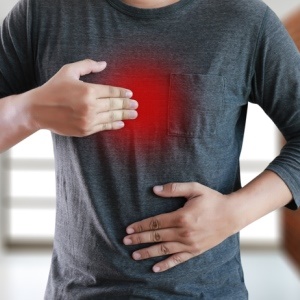
If you can’t look at a hamburger without getting a burning sensation in your chest and a bitter taste in your mouth, you’re not alone. Heartburn is one of the world’s most common ailments.
But how much do you really know about it? Have a look at these surprising facts – you may learn a thing or two that will douse the flames...
- About 25% of the sensory fibres connecting your oesophagus to your brain pass close to neurons that also receive sensory information from your heart. This is why it’s sometimes difficult to distinguish pain related to a problem with the heart (e.g. angina) from pain in the oesophagus (e.g. heartburn).
- Chewing bubble gum may not always be socially acceptable, but it can help to relieve heartburn. Chewing on something increases the production of saliva, which helps to neutralise stomach acid.
- Nocturnal gastro-oesophageal reflux disease (GORD) leads to reflux and heartburn while one sleeps, and is a fairly common occurrance. But did you know that nocturnal GORD can increase your risk for inflammation of the lining of the nose? If you experience a stuffy or runny nose, and often sneeze in the absence of a cold, you may have nocturnal GORD.
- Sleeping on extra pillows won’t necessarily help to alleviate heartburn when you sleep or lie down, as you may slip down in the night. Elevate your bed by about 15cm instead (place bricks or blocks under the feet). Gravity will work in your favour and less acid will flow back up into your oesophagus.
- Some people with GORD experience changes in taste and smell, which could affect their enjoyment of food. Acid reflux may cause damage to the palate and has the potential to cause taste abnormalities – another reason why it’s important to get heartburn checked out by a doctor.
- Apart from negatively affecting the functioning of your lower oesophageal sphincter (the valve-like structure between the oesophagus and stomach), smoking can also affect your heartburn medication (e.g. cimitidine). Smoking impairs the ability of the medication to lower the production of stomach acid while you sleep.
- While it’s best to avoid acidic foods like tomatoes, berries and citrus fruits when your oesophagus is inflamed as the acid may cause irritation, these foods have little effect on the pH of your stomach. Gastric juice has a pH of 2.0, while lemon juice has a pH closer to 2.5/3.0. So, eating acidic foods can't cause the stomach to become more acidic – it’s already as acidic as it can be.
- Chronic obstructive pulmonary disease (COPD), which includes emphysema and chronic bronchitis, is closely linked to GORD. Research shows that over 50% of people with later stages of COPD also have GORD. COPD may lead to frequent increases in intra-abdominal pressure, which contribute to reflux and heartburn. In turn, the reflux associated with GORD can increase COPD symptoms (e.g. coughing and wheezing), and trigger flare-ups.
Reference:
- Mahan, LK. Escott-Stump, S. Raymond, JL. (2012) Krause’s Food and the Nutrition Care Process - 13thedition. Elsevier. ISBN: 978-1-4377-2233-8
Image credit: iStock




 Publications
Publications
 Partners
Partners











